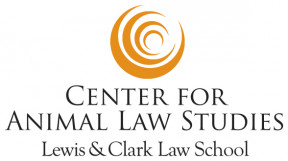Welcoming Applications for the Brooks Institute for Animal Rights Law & Policy LLM Fellowships
We are delighted to invite fellowship applications for the 2024-25 Academic Year.

Last spring, the Brooks Institute and the Center for Animal Law Studies (CALS) at Lewis & Clark Law School announced a first-of-its-kind collaborative effort that creates a cohort of up to three premier fellowships leading to a LLM degree in animal law. The Brooks Institute for Animal Rights Law & Policy LLM Fellowships are designed for exceptional candidates seeking to engage in for-credit fellowship work while earning the world’s first Animal Law LLM as a full-time student in Portland, Oregon. Candidates selected as Fellows will receive a full-tuition scholarship and generous living stipend. We are delighted to now welcome fellowship applications for the 2024-25 Academic Year.
The targeted and ideal fellowship candidates must demonstrate: a commitment to pursuing the protection and rights of nonhuman animals; and either superb scholarship potential or superb practice potential. Candidates must also meet all application requirements for Animal Law LLM admission. Mid-career animal advocates who can take a nine-month sabbatical from their advocacy organization are particularly encouraged to apply.
The cohort of three fellows is expected to create synergistic relationships among the fellows and academic faculty that will carry forward throughout their careers.
Candidates will undergo a highly competitive application process. If selected and awarded a Fellowship, Fellows will receive the benefit of:
- A full-tuition scholarship for up to 27 credits toward the Animal Law LLM for the 2024-25 Academic Year and the following additional scholarship support: LLM registration fees (estimated at $85), textbooks and supplies stipend (of $1,500). The award will also include the following (the amounts shown are for the 2023-24 academic year and are adjusted by Lewis & Clark annually): a stipend toward housing for the time period of August 1, 2024 through May 31, 2025 (of $10,000), maximum available on-campus meal plan or equivalent meal stipend (of $6,666), and basic health insurance offered by Lewis & Clark College (if not otherwise covered), excluding dental/vision coverage;
- The opportunity to establish a formal or recognizable scholarly, academic, and career mentorship with a CALS faculty professor;
- Supervision for rigorous pursuit of research intended for either: (1) publication in a recognized journal or law review, or (2) establishing a demonstrable legal practice expertise that can also benefit the animal law community; and
- Fellows will work with CALS faculty during the 2024-25 Academic Year for 2-3 credits per semester that will count toward the Animal Law LLM.
Fellows must agree to forgo paid or other than insignificant volunteer work outside of student animal law-related activities during the Fellowship period. Applications for the Brooks Institute for Animal Rights Law & Policy LLM Fellowship for the 2024-25 academic year are due by February 1, 2024 (11:59pm Pacific). To learn more information and to apply, visit this link.

Center for Animal Law Studies is located in Wood Hall on the Law Campus.
MSC: 51
email cals@lclark.edu
voice 503-768-6960
Center for Animal Law Studies
Lewis & Clark Law School
10101 S. Terwilliger Boulevard MSC 51
Portland OR 97219
More Stories

Companion Animal Law Evolves to Protect People and Their Pets
Lewis & Clark sparks a national movement to protect both people and their pets by redefining the role of companion animals in the legal system.

Protecting Farmed Animals in Memory of Thomas Bloom Raskin
Megan Rosen, LLM Candidate, Named Inaugural Recipient of the Thomas Bloom Raskin Animal Protection Scholarship

Manure Biogas is All Hat and No Cattle
Miranda Herreid, a JD student in the Farmed Animal Protection Project, breaks down why manure biogas is not the solution and will further entrench factory farming.

Moo Deng Highlights the Plight of Pygmy Hippos
Behind the viral memes lies the opportunity for an important conversation about wild animal protection